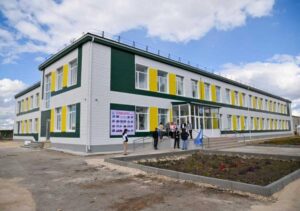AlmaU actively contributes to achieving SDG 9 (Industry, Innovation, and Infrastructure) by developing sustainable infrastructure and fostering innovation. The university implements programs that promote scientific research and technological advancements. AlmaU supports student startups and entrepreneurial initiatives by providing resources and mentorship to help bring their ideas to life.
AlmaU aims to become a comprehensive world-class university, with a particular focus on STEM education. Partnerships with industries are also seen as key to fostering university spin-offs and further research development.
AlmaU’s School of Tourism and Hospitality offers dual programs with globally renowned hotels (Rixos, Rahat Palace – Hyatt, Ritz Carlton) and dual degrees with the Swiss Education Group, providing internships at prestigious hotel chains across Europe.
The AlmaU Media and Film School is located at Kazakhfilm, Kazakhstan’s largest film studio. AlmaU launched this school in partnership with Qazaqfilm, featuring a joint program called “Digital Filmmaking,” dual training, shared activities, and use of Qazaqfilm’s infrastructure for practical experience, alongside student scholarships.
In 2022, AlmaU opened the Technology Commercialization Center, serving as a link between researchers and industry, creating a new revenue stream. AlmaU successfully presented the newly formed center during a roundtable with business professionals, industry experts, academics, and venture capitalists. Delegates discussed best practices for distributing scientific Deep-Tech innovations to tackle complex production challenges in August 2022.
Zeynep Multidisciplinary College: AlmaU has been fostering rural education for 14 years. The opening of the college in the North Kazakhstan region strengthens the region’s human capital. This initiative aims to improve local living standards and mitigate negative urbanization trends while promoting regional development.
The decision to open the college and shape the development concept of the rural area was driven by significant changes in national development priorities and the vision of rural development actors. Rural education now involves not only transmitting new professional and technical competencies but also unlocking individual capacities for self-realization, productive interaction with society, and the natural ecosystem of rural areas.
The modern rural college is envisioned as a center of educational attraction for the local community, enabling its potential for self-realization, and as a paradigm for creating entrepreneurial growth points for the benefit of society.
The main idea behind the transformation of Zeynep College is its evolution into a modern, innovative, multidisciplinary, and multifunctional educational ecosystem. This will attract students from neighboring regions and train highly skilled specialists with entrepreneurial mindsets, strong moral values, and legal knowledge.The village where the technical school was renovated is called Lobanovo. The renovation of the old building was a priority before the college’s opening. AlmaU’s team planned to make the building more comfortable and suitable for studying. The college was fully renovated and equipped with the necessary resources and infrastructure.
This modern, innovative, multidisciplinary, and multifunctional educational ecosystem covers the following professional fields: agriculture (crop production, livestock breeding, beekeeping), tourism and travel (ecotourism, agritourism, seasonal tourism), service industries (hospitality and catering), information technology and robotics, including applications for agriculture, rural management, entrepreneurship, and pedagogy for preschool and primary education.
Currently, the college serves local residents and students from five other regions of Kazakhstan. According to the region’s leader, the college can accommodate up to 500 students, with around 100 scholarships allocated by the government. In 2022, the college enrolled 90 students.
The regional government plans to develop the Imantau-Shalkar resort area to the level of the Burabay resort area in Northern Kazakhstan, boost tourism, and improve service quality. Therefore, specialists in management, hospitality, and restaurant services will be needed. According to the government’s plan, students will receive training in the Imantau-Shalkar resort area during their studies.

Заявка отправлена.
Мы свяжемся с Вами в ближайшее время.